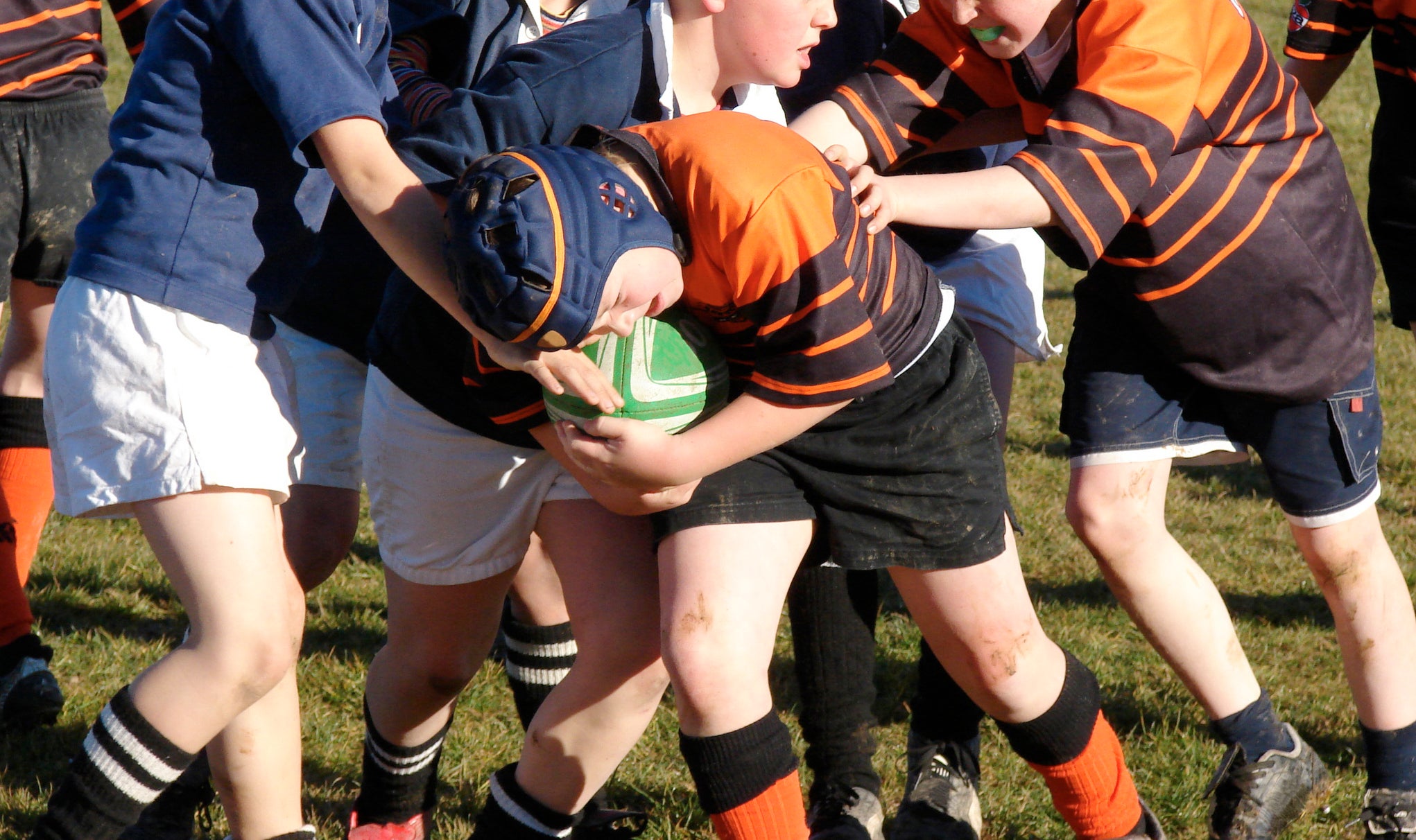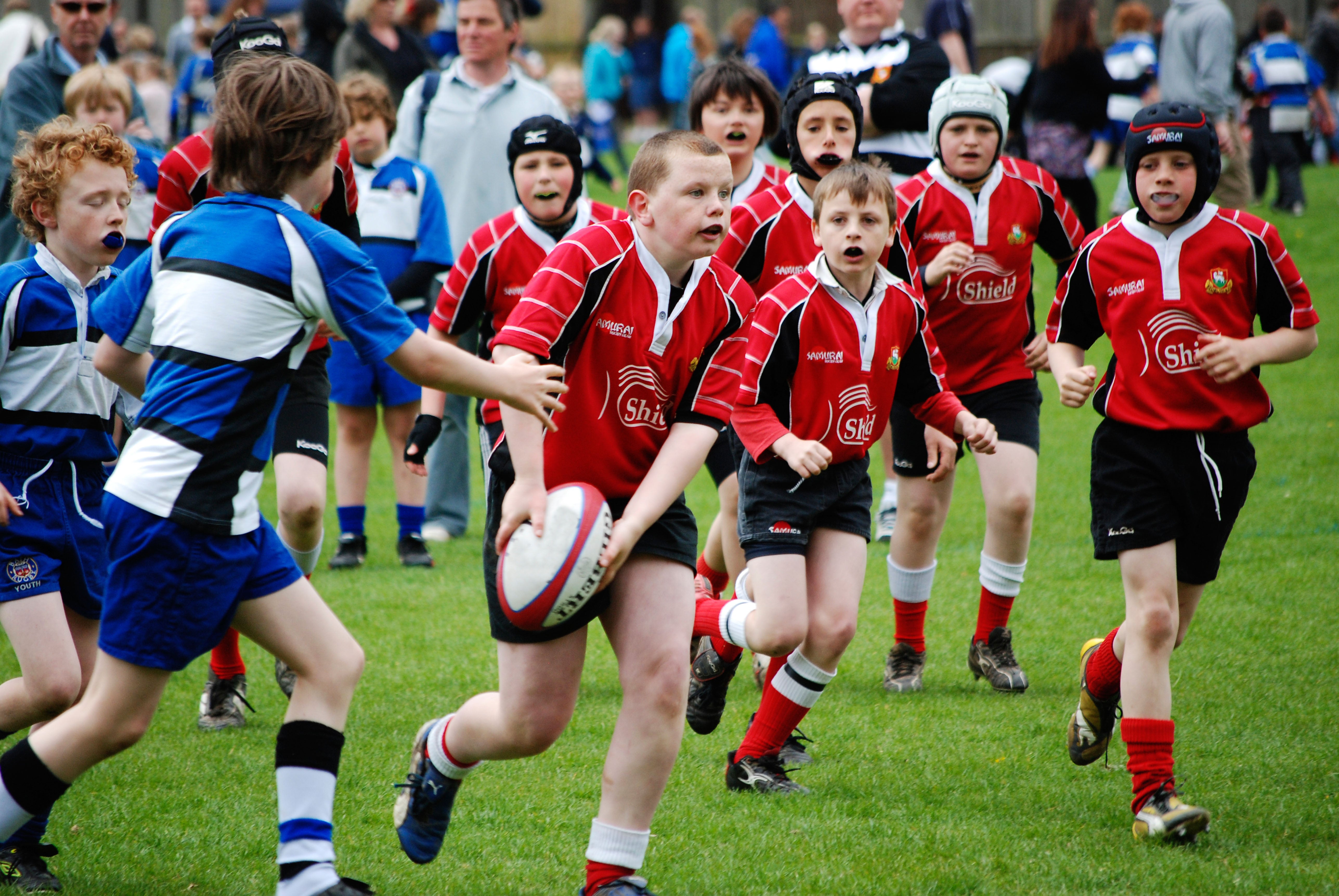Is playing rugby really a form of child abuse?
Researchers this week said crunching collisions inherent in the sport are damaging to the brains of children. On a weekend when thousands of children will be inspired by watching their heroes on the pitch, Jim White looks at what schools and clubs are doing to reassure parents


Many moons ago, soon after William Webb Ellis first picked up the ball and ran with it, a visitor arrived at Rugby School at the invitation of Frederick Temple, the headmaster. Temple thought his guest might be intrigued by the new ball game being played on the school fields. So the two of them stood on the sidelines as a session of what was soon to become known as rugby got underway. And the visitor was immediately taken aback by the violence on display. So much so, as he winced at the collisions and punch-ups, the smashes and smack-downs, he inquired of Temple whether he was ever moved to intervene to reduce the mayhem.
“Never,” came the reply. “Short of manslaughter.”
Two hundred years on from when Webb Ellis first did his bit of juggling, these days it is safe to say things are somewhat different. Or at least they are at St Edward’s in Oxford, one of England’s leading rugby schools, where the 800 pupils chuck a ball around up to five times a week.
“The moment we see any suspicion of a head knock – or even if we think we have seen one – that player is removed from the pitch, is given medical attention and doesn’t go back on,” says Joe Winpenny, the school’s head of rugby. “No argument.”
The game that Temple relished as the ultimate expression of “muscular Christianity”, a religious commitment to health and athleticism, has certainly developed over the years.
“Excellence in rugby has always been a fundamental part of our sell,” says Nic Bond, the school’s director of sport. “But at the core of that is pupil welfare. Their safety is our absolute priority.”
Matches, training, individual practice: everything is tailored at the school to mitigate against the chance of injury.
“We limit contact in training sessions, we study data on players’ injury records, the work we do in the gym is designed to make them more resilient to knocks,” says Winpenny. “You cannot eliminate the risk. Injuries can happen in any sport. But what you can do ... is be alert at all times.”
However, not everyone is convinced such assiduous attention to young players’ wellbeing is enough. This week, researchers from Winchester, Nottingham Trent and Bournemouth universities published a report that concluded that rugby is tantamount to child abuse. Professor Eric Anderson, the report’s author, insists that, whatever the safety measures in place, the collisions inherent in the very fabric of the sport “cause cognitive harm and increase the risk of neurodegenerative diseases and dementia; they are therefore abusive to a child’s brain. Cultural perception is that striking a child outside sport is abuse but striking a child in sport is somehow socially acceptable. We are trying to change that. It doesn’t matter what the social context is, the brain is damaged in both.”

Meanwhile, more than 300 former professional players from across the globe have instigated a class action case against several rugby authorities claiming culpable negligence when it came to the recognition of the dangers in the sport. Claimants such as the England World Cup winner Steve Thompson, the Welsh flanker Alix Popham and his international skipper, Ryan Jones, have all been diagnosed with early onset dementia, a condition they insist was brought on by multiple head injuries incurred while playing or training.
Such is the growing furore about the game’s potential long-term implications, if you were a parent of a sporting mad youngster, you might think twice about steering them towards rugby.
“Yeah, I admit it is a worry,” says Brian Sterling, a former player himself whose son plays school rugby (though not for St Edward’s). “You can’t sugarcoat it, it’s a bloody tough game, especially when they get to 16, 17, they’re built like tanks. I’m prepared to let my lad take the risk because he gets so much out of playing. But I understand why some parents don’t want their kids involved.”
Indeed, the number of parents opting their children out of the game is growing. Even at St Edward’s, a school renowned for its rugby, some parents would rather their children played football or hockey. Or did a bit of rowing. Anything but rugby.
“With the negative narrative around the game, it wouldn’t be right for me to claim parents don’t say no to rugby,” says Bond. “Over the past five years, there has been between maybe a five to 10 per cent drop off, of parents not giving consent to play. We’ve got to adapt to that.”
And even for parents who do allow their children to ruck and maul, attitudes are informed by wider issues.
Dismissing this as woke madness is to miss the point. There is a lot of sporting competition. Simply telling parents they’re being softies and they need to get on with it means they’ll take their kids off to football, basketball, swimming instead
“You read this stuff and it’s there at the back of your mind when you watch: this could go horribly wrong,” says Sterling. “Luckily for me, so far, our boy hasn’t had any problems. Touch wood.”
Peter Robinson was not so lucky. Back in 2011, he was watching his 14-year-old son Ben play in a cup game for Carrickfergus Grammar School in Northern Ireland. A fearless lad, Ben was first into every tackle, a whirlwind of vim and vigour. In a free-for-all early in the match he knocked his head and was temporarily fogged. But he played on. It happened again. This time he came off the pitch. But he was soon back in the fray, insisting to his coach he could carry on. That, after all, was one of the lessons of the game: just get on with it. Then, with only moments left in the match, there was another collision. This time he lost consciousness. And he never woke up again.
In the 13 years since his son’s horrific death, Robinson – who was a keen player himself – has campaigned tirelessly to raise safety standards not just in school rugby, but all grassroots versions of the game. “If only some good can come out of this,” he has said of his son’s death.
The primary goal of his organisation Progressive Rugby is not to get the sport banned for schoolchildren but to improve awareness of potential problems. The old methodology of applying the magic sponge to injury is no longer remotely plausible. His key aim is to get a protocol he named “if in doubt sit it out” instilled across the junior game. He would be pleased to know that at St Edward’s, that approach informs their systems.

“Every team has at least two coaches,” says Winpenny. And given that on any Saturday in their autumn term rugby season, the school fields 13 teams, that is a lot of coaches. “It means if something happens to a player, one coach can give the child their full attention. Our medical provision here is exceptional, with full-time medical staff on site who can be there within the drop of a hat. There is an element of risk to the game, we can’t pretend there isn’t. What we have been clear about is that we are constantly looking at how we can make the experience as safe as possible. Putting these measures in place, we’re getting there.”
Not everybody within the sport is happy about such caution. The increasing presence of safety protocols – such as insisting children under the age of 11 play touch rugby, or reducing the amount of contact in training, or the new rule introduced to junior rugby making tackles above the sternum illegal – is by no means universally popular. The former England fly-half Andy Goode was one of many rugby enthusiasts outraged by Anderson’s report.
“For the academics to come out and talk about child abuse and try and get rugby banned, I think they need to get back in their box and go away,” he said on GB News.
While his old international colleague Will Greenwood, writing in The Telegraph, worried that what he called “wrapping kids in cotton wool” would be detrimental to their development. Addressing risk, he argued, was a fundamental part of growing up. Take that out of sport and its purpose is emasculated.
Professor John Fairclough, who together with Robinson runs Progressive Rugby, though, believes for its future stability, the game has to acknowledge its issues. Particularly at the junior level. Any dismissal of the safety worries is ultimately, he reckons, self-destructive.
“The respective unions overlook the concerns in the schools and community game at their peril,” he says. “Here, where the huge majority of players exist, education remains the priority, and it’s undeniable that an informed and rational conversation about what age contact should be introduced needs to be had.”

In truth, many within the game agree. Paddy Gregan, a past chair of the Oxfordshire Rugby Union and an advocate of awareness, counsels against harrumphing about change.
“Dismissing this as woke madness is to miss the point,” he says. “There is a lot of sporting competition. Simply telling parents they’re being softies and they need to get on with it, means they’ll take their kids off to football, basketball, swimming instead. They’ll vote with their feet. Rugby needs to address this and reassure parents. Otherwise, it will be in ever-growing trouble.”
And, at private schools, parents voting with their feet provides a further caveat: they will take their fees with them. If they are to continue to offer rugby, and with it all the inherent benefits of team building and collective problem solving, schools such as St Edward’s have to provide reassurance.
But then, intriguingly, as they sit in the school’s magnificent new pavilion, decorated by framed shirts from former pupils who have gone on to the highest echelons of the game, the St Edward’s staff do not believe change is detrimental to rugby. Far from it. They reckon the unintended consequence of the enhanced awareness they practise has been an all-around improvement in game understanding. For instance, instead of training sessions consisting largely of tackling, scrums and collisions, the young players at the school spend the vast majority of their practice time enhancing their skills.
“When I played, training was all about hits,” says Winpenny. “Now the kids are far more used to handling the ball than I was. We coach them to keep the ball moving, avoid contact areas, search out space, not collisions. I’d say this generation being brought up on less contact, with more touches of the ball, they are better than I was. And they’re having just as much fun.”
The improvement in safety protocols during games too has fed into results. At the school, they use data to keep track of injury history: every pupil’s fitness is monitored from the moment they first arrive on the premises. Early intervention and prevention leads to far fewer long-term issues. And the results, Winpenny reckons, are significant.
“This last season, in the first 15, we had just one injury. It was also our most successful season results-wise in a generation. I don’t think that is a coincidence.”
Join our commenting forum
Join thought-provoking conversations, follow other Independent readers and see their replies
Comments

Bookmark popover
Removed from bookmarks